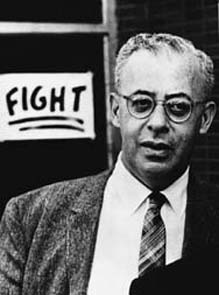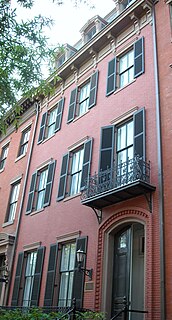Community organizing describes a wide variety of efforts to empower residents in a local area to participate in civic life or governmental affairs. Most efforts that claim this label operate in low-income or middle-income areas, and have adopted at least some of the tactics and organizing techniques pioneered by Saul Alinsky and his Industrial Areas Foundation. Other organizations in this tradition include PICO National Network, Gamaliel Foundation, and Direct Action and Research Training Center (DART).

Community organizing is a process where people who live in proximity to each other come together into an organization that acts in their shared self-interest.

Saul David Alinsky was an American community organizer and writer. He is generally considered to be the founder of modern community organizing. He is often noted for his book Rules for Radicals (1971).
The Industrial Areas Foundation (IAF) is a national community organizing network established in 1940 by Saul Alinsky, Roman Catholic Bishop Bernard James Sheil and businessman and founder of the Chicago Sun-Times Marshall Field III. The IAF partners with religious congregations and civic organizations at the local level to help them build organizations of organizations, referred to as broad-based organizations by the Industrial Areas Foundation, with the purpose of strengthening citizen leadership, developing trust across a community's dividing lines and taking action on issues identified by local community leaders.
They focus on building political power in the hands of an organization of local residents, and using that power to influence issues the organization defines as important. Congregation-based Community Organizing (CBCO) works through local synagogues, churches, and mosques as the primary institutional sponsors of this work. Common characteristics:

A church building or church house, often simply called a church, is a building used for Christian religious activities, particularly for Christian worship services. The term is often used by Christians to refer to the physical buildings where they worship, but it is sometimes used to refer to buildings of other religions. In traditional Christian architecture, the church is often arranged in the shape of a Christian cross. When viewed from plan view the longest part of a cross is represented by the aisle and the junction of the cross is located at the altar area.
- Faith-based: They ground their organizing in the moral values and traditions that stem from religious faith, to varying degrees and often quite powerfully. See religion and peacebuilding.
- Broad-based: They are typically ecumenical or interfaith, and many include schools, unions, or a variety of other community-based institutions like neighborhood associations.
- Locally constituted: They organize in areas that range from large neighborhoods to entire cities. Although linked into the national and regional networks discussed above, they emphasize local grassroots organizing.
- Multi-issue: Their purpose is to instruct local congregational authorities about how to effectively address a variety of pressing issues facing their communities.
- Professionally staffed: CBCO groups hire professionals to recruit and train leaders to work with their religious communities on a personal and regular basis.

Religion and peacebuilding refers to the study of religion's role in the development of peace. Scholars generally accept that religion has been, at different points in history, both advantageous and ruinous to the promotion of peace However, there have been many approaches to explaining this variability.

The term "ecumenism" refers to efforts by Christians of different Church traditions to develop closer relationships and better understandings. The term is also often used to refer to efforts towards the visible and organic unity of different Christian denominations in some form.

Interfaith dialogue refers to cooperative, constructive, and positive interaction between people of different religious traditions and/or spiritual or humanistic beliefs, at both the individual and institutional levels. It is distinct from syncretism or alternative religion, in that dialogue often involves promoting understanding between different religions or beliefs to increase acceptance of others, rather than to synthesize new beliefs.








